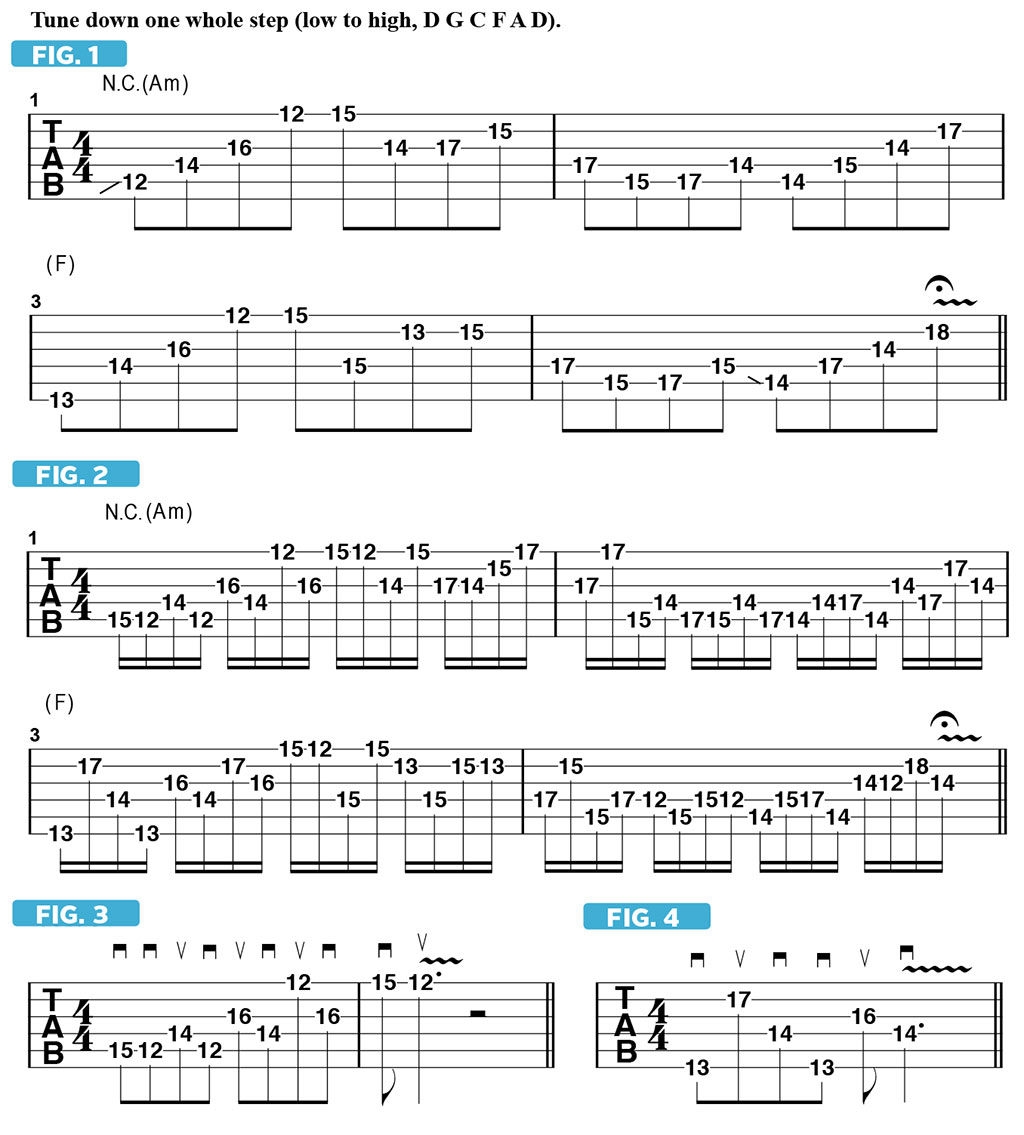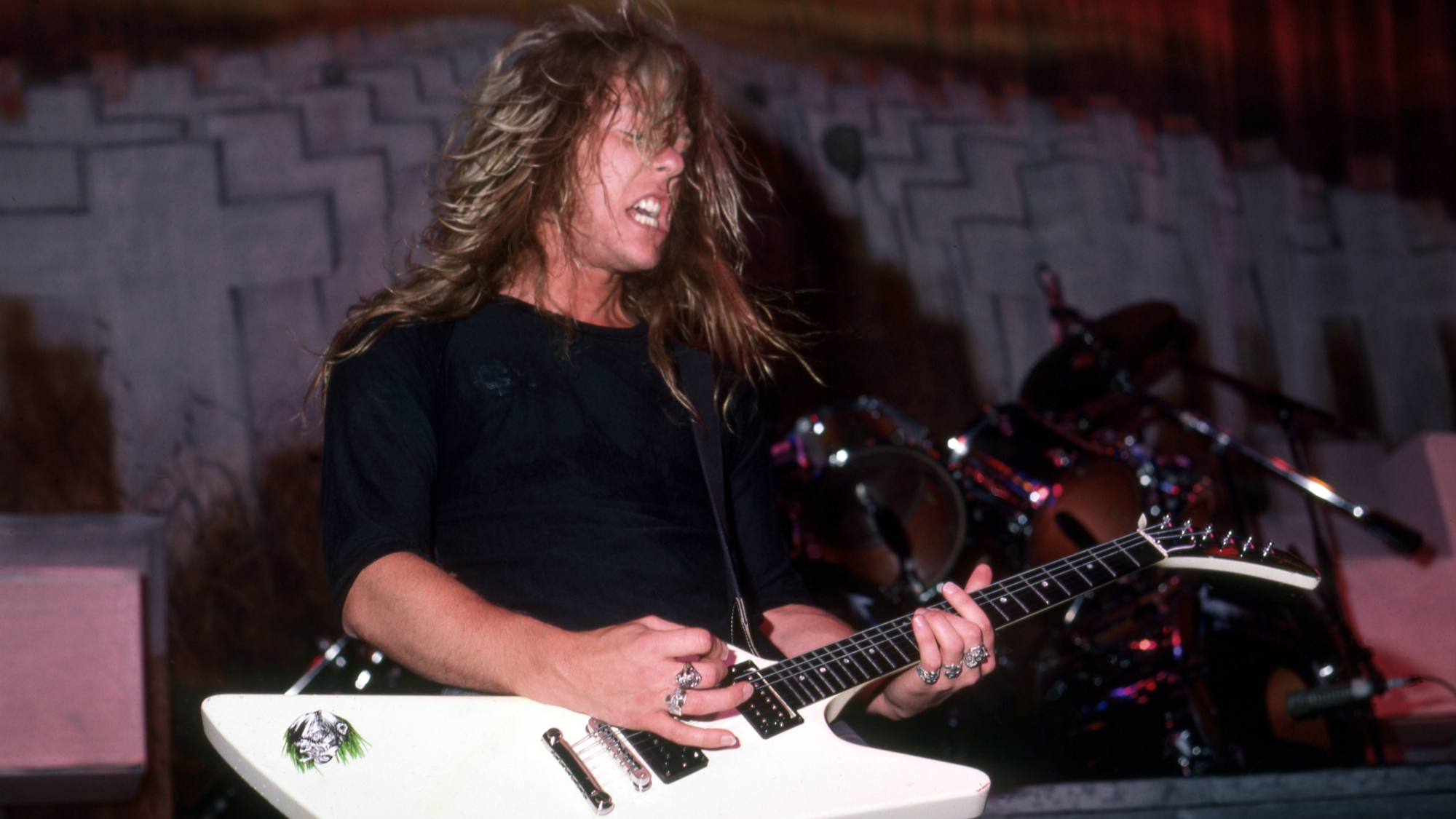Jason Richardson: unusual and challenging string-skipping patterns
Do your best to keep up with these dizzying, hand-strengthening string-skipping patterns
For a lot of the music I write, I like to devise complex and constantly changing arpeggio patterns that outline melodic and harmonic ideas. This will often lead me to some obscure and rather challenging string-skipping sequences. In this lesson, I’d like to present a few of the main parts from a song of mine called “Retrograde,” which is from the album I [Jason Richardson Music] and demonstrates this approach.
In the beginning of the song, I play the slow, ambient melody transcribed here in FIGURE 1. Picked in a rhythm of steady eighth notes, the arpeggios in bars 1 and 2 outline Am7, and in bars 3 and 4 the low F note steers the harmony towards Fmaj9#11. When playing through this figure, use alternate (down-up) picking throughout, striving for clean and clear articulation with both hands.
I had a vision to play a variation on this melody using a timed, “dotted-eighth” delay effect, but instead of employing a delay I decided to figure out how to perform the part and achieve the same effect without it, manually, which made it technically very challenging. For those unfamiliar with the abovementioned delay “trick,” as it were, the idea is to perform a melodic line in steady eighth notes, with the delay effect set to match the volume of the dry signal and with a single echo repeat, which you time, according to the tempo of what you’re playing, to a dotted eighth-note rhythm, which is equal in duration to three 16th notes. After you pick the first two eighths, the first note then repeats on what would be the third 16th note of the beat, and what follows is a “chain reaction” of layered picked and echoed notes that fill in all the 16th-note gaps and create the aural illusion that you’re picking 16th notes, even though you’re only playing eighth notes. Eddie Van Halen employed this effect and technique brilliantly in “Cathedral,” as did Albert Lee in “Country Boy.”
The first thing I did was transcribe the straight eighth-note melody in the Guitar Pro notation program. I then filled in all the 16th note “gaps” with what would theoretically be the delay-repeated notes, so that I could hear what the “delay-trick” effect would sound like. Listening to the program’s MIDI playback of the line, I thought it sounded insanely sick and cool, and so I forced myself to learn how to play it that way, without using a delay.

FIGURE 2 represents what the lick sounded like. Performed as straight 16th notes, the pattern emulates the dotted-eighth delay effect, although it does not mirror it exactly, in that not every single eighth-note pitch from FIGURE 1 is repeated three 16th notes later. Many of them are, however, and the overall effect that I achieve here convincingly emulates the delay-trick effect. As you can see, it’s definitely a workout to perform this line flawlessly and up to speed!
When picking every note in this sequence, I realized it would be easier to break from a strict alternate picking pattern and instead use two downstrokes or upstrokes in a row in a few very specific spots. The reason is that I prefer the pick direction to be coming from “outside” of a string pair instead of “inside,” meaning that, after striking a given string with a downstroke, I don’t want to have to move to a lower string with an upstroke, especially when skipping. It’s always easier for a downstroke to be followed by a note on a higher string, and for an upstroke to be followed by a note on a lower string. It is for this reason that, as illustrated in a simpler eighth-note rhythm in FIGURE 3, I begin the phrase with two consecutive downstrokes. I do a similar thing in bar 3 of FIGURE 2, as shown in eighth notes in FIGURE 4. I pick the third and fourth notes with downstrokes, on the D and low E strings, followed by an upstroke on the G string.
Jason Richardson is best known for his work with All Shall Perish, Born of Osiris and Chelsea Grin. He’s currently lead guitarist for All That Remains.
Get The Pick Newsletter
All the latest guitar news, interviews, lessons, reviews, deals and more, direct to your inbox!
“There are so many sounds to be discovered when you get away from using a pick”: Jared James Nichols shows you how to add “snap, crackle and pop” to your playing with banjo rolls and string snaps
Don't let chord inversions bamboozle you. It's simply the case of shuffling the notes around







![Joe Bonamassa [left] wears a deep blue suit and polka-dotted shirt and plays his green refin Strat; the late Irish blues legend Rory Gallagher [right] screams and inflicts some punishment on his heavily worn number one Stratocaster.](https://cdn.mos.cms.futurecdn.net/cw28h7UBcTVfTLs7p7eiLe.jpg)


